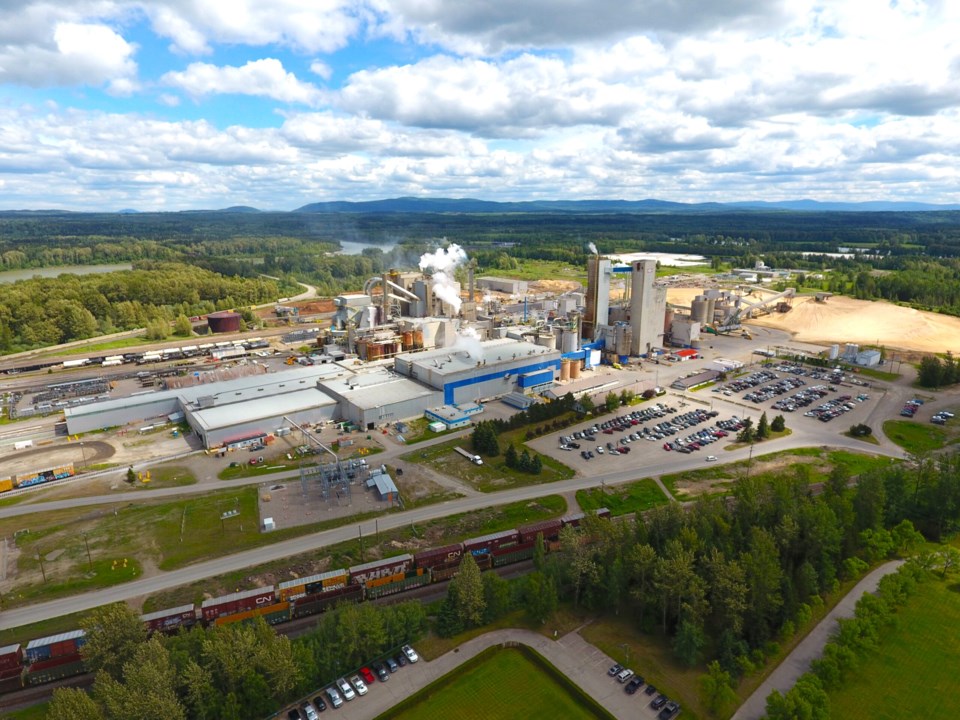Canfor’s pulp operations in central BC including Northwood Pulp in Prince George, as well as West Fraser Mills’ Cariboo Pulp and Paper facility in Quesnel, are collectively receiving more than $2 million from the CleanBC Industry Fund.
A Tuesday, Aug. 12 media release said that Canfor Pulp Inc. was receiving $1.268 million for three projects:
- $838,000 to “replace a system that recovers wet lime dust with a new dry dust system in order to lower the moisture content of material entering the lime kiln and to reduce combustion of natural gas in the lime kiln” at Northwood Pulp in Prince George
- $373,620 to study technology that would produce renewable dimethyl ether from residual forest wood waste
- $53,610 to study energy savings and emissions reductions through optimizing brownstock washing operations
West Fraser Mills Ltd. is receiving $851,144 for four feasibility studies at Cariboo Pulp and Paper in Quesnel:
- $266,370 to study upgrades to the facility’s tall oil plant including replacing natural gas as a fuel source
- $186,906 to investigate the viability of modifying or replacing the biomass boiler generating bank by improving erosion and thinning mechanisms
- $155,475 to investigate the improvements of steam plant operations through advanced automation
- $72,679 to study an optimization strategy for the facility’s evaporators to improve efficiency and reduce emissions
The company is also getting $169,714 to study improvements to biomass boiler combustion efficiency at its Quesnel Plywood facility.
Speaking to reporters Tuesday from Vancouver, Energy Minister Adrian Dix said that as parts of the world experience the impact of climate change, global markets are demanding cleaner, lower carbon products.
The total $35 million from the CleanBC Industry Fund, he said, supports improvements that would otherwise be too risky or costly for companies to afford by themselves.
“Now is the time in the face of tariffs from the United States when we need to become more self-sufficient in energy and drive a cleaner, stronger, more self-sufficient economy here in BC and the Clean Industry Fund does just that,” Dix said.
The previous weekend, BC Hydro announced that the Site C Dam was fully operational after the sixth and final generating unit went online.
Responding to a question from The Citizen, Dix said that the province is looking at a full array of projects in its next calls for power projects.
“In addition to the second call for power that … the premier announced in May, we had a call for expressions of interest for what’s called firm power,” Dix said.
“That would include other hydro, geothermal, the potential of carbon capture and natural gas, that would include other things, other options. What we want to see in BC is to build out, because we need not just intermittent power, which is sometimes what wind energy provides, we need firm power as well.”
The province’s first call for power from late 2024 led to approval for a wind project co-owned by Lheidli T’enneh First Nation and Spanish firm Ecoener planned for construction in the Hixon area.
Back in late February, Dix announced regulatory changes that increased the requirement for made-in-BC renewable diesel content in diesel sold in the province.
This move was aimed at helping facilities like the Tidewater Renewables diesel refinery in Prince George, which company CEO Jeremy Baines warned was at risk of closure as it was unable to compete with American producers which received subsidies both in the U.S. and Canada.
“We’re constantly reviewing those changes, working with companies such as Tidewater to see that we act in the public interest,” Dix said on Aug. 12 when asked if he was considering any further adjustments.
“Those projects see a significant reduction, of course, in emissions in BC and Tidewater is an important company here. So, we are reviewing as we said we would with them to make sure that we have on the renewable diesel side the right balance there.”
On Aug. 11, BC Attorney General Niki Sharma announced the province would appeal a recent BC Supreme Court Decision awarding four First Nations the title to land owned by various parties, including all three levels of government, along the Fraser River in Richmond.
Asked whether the court’s decision could affect future investment in BC energy projects, Dix pointed to his government’s calls for power that have required First Nations’ involvement as well as First Nations involvements in liquified natural gas projects that have recently started sending out shipments.
Other recipients of the CleanBC Industry Fund money include AltaGas Holdings, ARC Resources, Cenovus Energy, NorthRiver Midstream, Ovintiv Canada, Pacific Canbriam and Tourmaline Oil Corp. projects in northeast BC.


